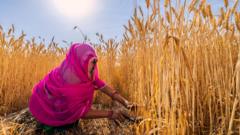With the Indian Meteorological Department reporting the hottest February in 125 years, the onset of summer seems to have come prematurely, potentially signaling dire consequences for both agriculture and industry sectors across India. Nitin Goel, a textile manufacturer from Ludhiana, has observed an alarming shift in his business, where the demand for winter attire has plummeted. "We've had to focus on producing t-shirts instead of sweaters," Goel explained. "Sales are down 10% this season alone."
As temperatures continue to soar, farmers face similar disruptions. In Devgad, Vidyadhar Joshi, a mango grower, predicts a significant dip in production of the famous Alphonso mango, estimating yields to be only 30% of the norm due to increased irrigation costs and labor shortages. The situation worsens when considering the health of staple crops like wheat, chickpea, and rapeseed, with independent experts noting that projections for the upcoming harvests are far from optimistic.
Compounding these issues, drought-inducing heatwaves could exacerbate the water crisis, with Northern Indian reservoirs reported to be at reduced capacity; this decline impacts food production, leading to rising concerns over inflation and economic instability. Observers like economist Madan Sabnavis warn that the ripple effects from a poor agricultural season could jeopardize India's growth trajectory just as rural consumption shows signs of recovery.
To mitigate these risks, think tanks are urging improvements in weather prediction infrastructure and agriculture insurance, coupled with adaptive cropping strategies guided by climate models.
Climate change continues to reveal its influence, as three out of four Indian districts are categorized as "extreme event hotspots," reflecting a disturbing trend wherein traditional flood zones face unprecedented droughts. With an estimated income loss of $159 billion across various sectors due to climate-induced labor capacity reductions, action must be taken urgently. India's economic stability hangs in the balance as policymakers grapple with the realities of a warming climate.















